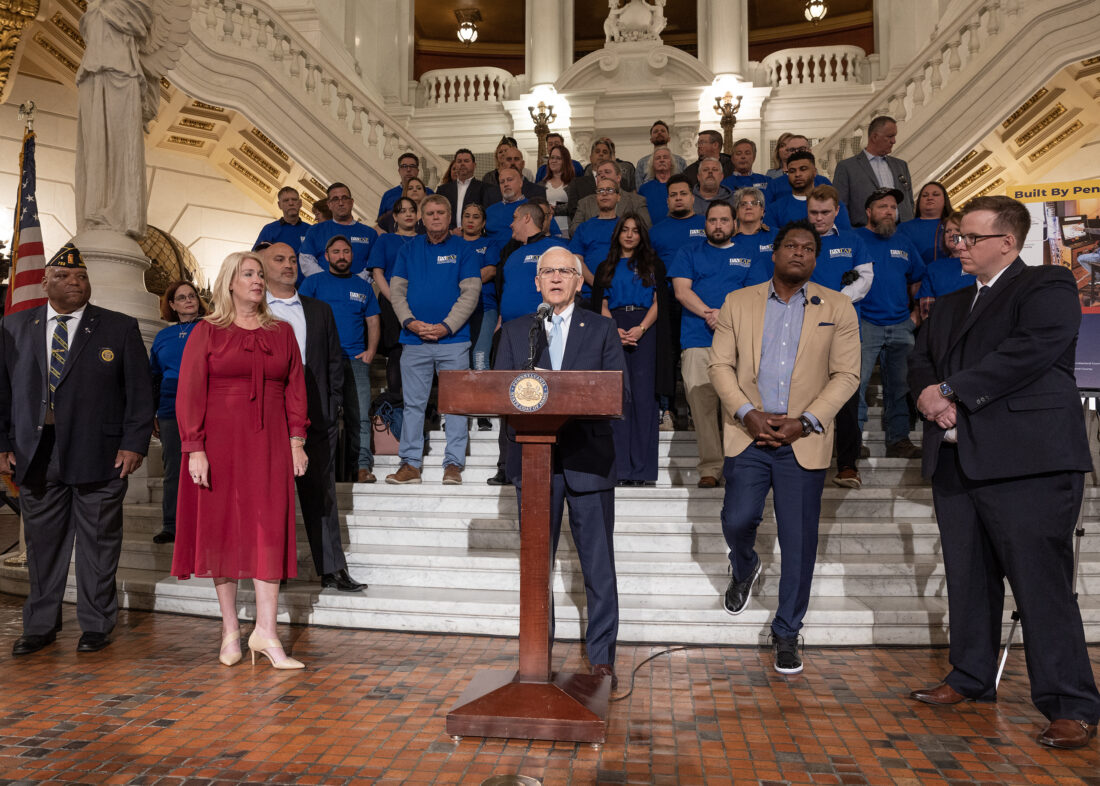A Lycoming County manufacturer of skill games was among those supportive of legislation sponsored by a local lawmaker that would regulate and bring an estimated $300 million annually to Pennsylvania through games played
Supporters of legal skill games gathered recently at the State Capitol to call for the passage of legislation sponsored by Sen. Gene Yaw, R-Loyalsock Township, that would establish a taxing structure and regulatory framework for skill video games in the Commonwealth.
Joined by small business owners, veterans, members of the Pennsylvania Taverns and Players Association (PA TAP), and fellow lawmakers, Yaw told attendees the proposal could result in an estimated $300 million in immediate annual tax revenue and would help rid the market of illegal, unlicensed games.
The conference brought out state Rep. Danilo Burgos, sponsor in the House of the skill video game legislation, LaVar Arrington, former Penn State and NFL player and proponent of skill games community support and charitable giving, representatives of veterans’ organizations and Doug Sprankle, chair of Pennsylvania Taverns and Players Association (PA TAP).
“If you want to know why skill games are important, just walk into a neighborhood market in western Pennsylvania. Visit a family-owned restaurant in Lebanon County or a VFW in Bucks County,” Yaw said. “Skill games are a piece of the small business economy in our state, and today we heard from supporters from all walks of life on the importance of the revenue they provide. It is time we recognize the benefits of this emerging industry and offer regulatory support, so we can ensure it flourishes-safely and responsibly.”
Among the participants in the conference was Nicole Miele, owner of Miele Manufacturing, a Lycoming County-based manufacturer of skill game terminals located in Yaw’s senate district.
“Skill games are built in Pennsylvania and 90% of the revenue from the finished products stay right here in the Commonwealth to help support the communities they are found in,” Miele said. “Skill games mean good-paying, family sustaining jobs across the board. As the legal skill game business grows, so does the small business community.”
Under the proposed legislation, which includes a valid I.D. requirement to play and a limit on the number of machines per establishment, all games will be required to be connected to a terminal collection and control system that allows the Commonwealth to monitor all transactions and ensure that all taxes are accrued and paid.
Additionally, the legislation will strengthen penalties for those who operate unlicensed and illegal games and gambling devices.
Miele and her husband, Louis, are third-generation owners, and they have children who may be fourth generation owners of their business.
“Patrons want to play legal skill games because they are funded and people can win money,” Miele said.
For the establishments providing them, the games create supplemental revenue for businesses to continue to operate. The benefits go beyond those playing and providing the games to include the manufacturer of the games. Pennsylvania skill games are largely built with parts and services provided by companies throughout the state.
As examples, much of the wood structure for the games comes from Lancaster County, steel from Lycoming County, trucking needs from Northumberland County and cardboard from Tioga County.
Growth of the industry is unmistakable.
When Miele’s sister company, Miele Manufacturing, began to build the games, it had about a dozen employees. Today, their employee roster is around 200 workers.
And, within the last year, the business expanded into a complex that was sitting empty in Muncy Township and is covered with solar on its roof.
The games’ ripple effect involves these employees visiting local restaurants, shopping local stores and visiting local businesses.
Additionally, the games have created an ability for the businesses to remain committed and responsible corporate neighbors, able to donate millions of dollars to local charities, educational foundations, food banks, women’s shelters, public libraries, police K-9 programs, youth sports veterans organizations, fire companies and more.
Yaw noted the significant difference between playing games of chance and skill games.
“I can play a casino game on my phone and buy Lottery tickets standing here talking to you,” he said. “The difference is with skill games you need to be there in person. You need to show up.”
That becomes important to the businesses and social clubs that offer them to patrons.
Diving into the legislation, Yaw said, it will limit the number of skill games that can be located in any establishment.
“No more than five games, so as not to institute a program of mini-casinos, and social clubs could have up to 10 games,” he said.
The difference, too, between games of chance and skill games is that games of chance are automatically programmed.
“You can affect the outcome,” Yaw said. “Can everybody do it?” “No,” he answered, “but skilled players can affect the outcome of the game, which is a major distinction in all of the legal decisions made to date.”
As Miele noted, skill games are located in community fraternal clubs, social clubs, fire halls and convenience stores.
“That’s where they are located,” Yaw said. “It’s a neighborhood type operation.”
In a poignant reminder of skill games importance, Yaw expressed how moved he was when a member of an American Legion in Muncy approached him and thanked him for taking the lead in the senate on skill games legislation.
“‘But without these games, this chapter of the American Legion would have closed,'” Yaw said that the American Legion member told him.
For more state-related news and information, constituents can visit Yaw’s website at www.SenatorGeneYaw.com or follow him on Facebook and Twitter @SenatorGeneYaw.
---
This article was originally published by the Williamsport Sun-Gazette on April 28, 2023.

